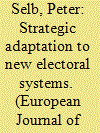| Srl | Item |
| 1 |
ID:
149613


|
|
|
|
|
| Summary/Abstract |
This article views electoral campaigns as a means of communication in the process of electoral coordination. Well-manned and well-funded district campaigns facilitate voters’ learning about the policies of competing parties; if the funds and the activist support are supplied by local constituencies, campaigning also informs voters about the relative support of competing parties in the district. Using district-level data from the 2009 general election in India, as well as the measures of the affluence of district residents obtained from the Indian Human Development Survey, 2005, an estimation was made of the effect of the affluence of electoral constituencies on the intra-district coordination. The analysis also includes the known determinants of strategic voting as control variables.
|
|
|
|
|
|
|
|
|
|
|
|
|
|
|
|
| 2 |
ID:
120134


|
|
|
|
|
| Publication |
2013.
|
| Summary/Abstract |
A number of institutional and non-institutional factors hamper electoral coordination and, hence, increase party system fragmentation in the nominal tier of mixed electoral systems. Contrary to expectations, the number of electoral parties is not lower in all old democracies. Nevertheless, the level of democratic experience modifies the effect of other variables like the type of mixed electoral system or the closeness of the races. Econometric tests evaluate this phenomenon in a diverse sample of 15 countries and a total of 57 elections with more than 10,000 observations at the district level.
|
|
|
|
|
|
|
|
|
|
|
|
|
|
|
|
| 3 |
ID:
113305


|
|
|
|
|
| Publication |
2012.
|
| Summary/Abstract |
How quickly, to what extent and under what conditions do voters and elites adapt to new electoral institutions in order to not waste their votes and effort on hopeless competitors? A latent-curve model of strategic adaptation is developed and fitted to district-level election data from Spain. The extent of strategic adaptation is generally found to vary with the strength of the electoral system. However, grave ethnic tensions are demonstrated to seriously retard adaptation even under favourable institutional conditions.
|
|
|
|
|
|
|
|
|
|
|
|
|
|
|
|